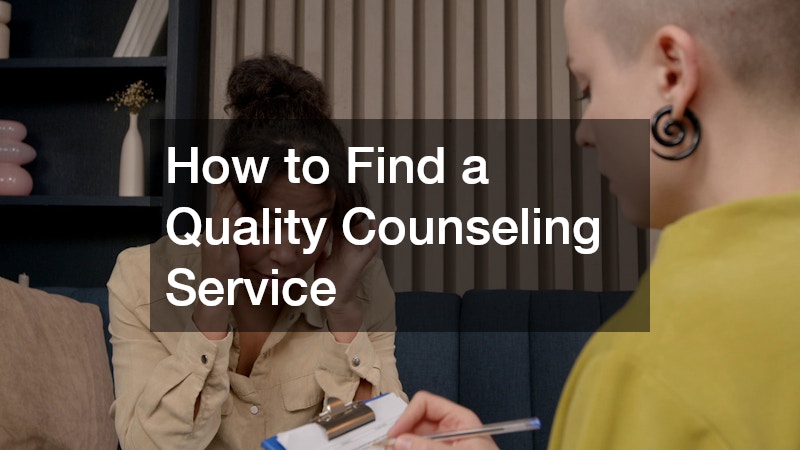Finding the right therapist is a personal decision, and a thoughtful plan makes the search far less stressful. Start by setting clear goals, then investigate training, methods, and logistics so you know what to expect. The process should help you feel informed, respected, and safe. With a few practical steps, you can identify a local counseling service that aligns with your needs and values.
Clarify Your Goals Before You Search
Write down what you want to work on and how you will know therapy is helping. Some people want tools for anxiety or sleep, while others need space to process grief, trauma, or relationship shifts.
Decide whether you prefer structured skills training, deeper insight work, or a blend. This clarity will guide your conversations, help you filter options, and set a foundation for measuring progress.
Verify Credentials, Experience, and Approach
Ask about licensure and specialization, such as LPC, LCSW, LMFT, PsyD, or psychiatrist. Experience matters, especially with issues like trauma, OCD, or couples conflict. Inquire which methods the clinician uses and why, for example CBT, ACT, EMDR, or emotionally focused therapy. A good provider explains how the approach fits your goals and what your first few sessions will look like.
Evaluate Fit and Communication Style
Therapy works best when you feel understood and supported. During a consult, notice if the clinician listens closely, reflects your concerns accurately, and offers a clear plan. Ask how feedback is handled and how you will review progress together. If the chemistry is not there, it is fine to keep looking until you find a local counseling service that feels comfortable and collaborative.
Check Practical Details That Affect Follow-Through
Consistency drives results, so logistics should make attendance easy. Confirm session length, availability, and whether the office is accessible by car or transit. If you prefer virtual visits, ask about the telehealth platform and privacy practices. Clarify fees, insurance or superbills, and cancellation policies. When these pieces fit, a local counseling service becomes much easier to stick with week after week.
Understand Ethics, Privacy, and Boundaries
A quality practice follows clear ethical standards and protects your confidentiality. Ask how records are stored, how contact outside sessions is handled, and what happens in emergencies. Discuss mandated reporting so you understand limits to confidentiality. Strong boundaries build trust, reduce confusion, and keep your work focused on your goals.
Compare Value, Not Just Price
Affordable care is important, but the lowest fee is not always the best fit. Consider the provider’s expertise with your concerns, the quality of the treatment plan, and how progress will be measured. Ask about between-session resources like worksheets, reading, or brief check-ins when appropriate. Value shows up in consistent improvement, not just a cheaper invoice.
Start With a Trial Plan and Review Progress
Propose a short trial, such as four to six sessions, with specific goals and check-in points. Agree on how you will track change, whether through symptom scales, sleep logs, or journaling. If you feel stuck, bring it up directly so your therapist can adjust the plan, method, or frequency. When a local counseling service invites honest feedback and adapts, you are more likely to see steady gains.
Ask Smart Questions During Your Consultation
Prepare a short list so you cover what matters most to you. Consider asking: What outcomes can I expect in the first month? How do you tailor your approach to my goals and identity? What does a typical session look like, and what will I practice between sessions? Thoughtful questions help you compare options and choose with confidence, rather than guessing based on a website alone.
Final Checks Before You Commit
Look for clear paperwork, transparent policies, and straightforward scheduling. Notice whether staff are responsive and respectful when you call or email. Read intake forms to understand fees, consent, and communication rules. When these details feel organized and humane, it is a strong sign that the same care will show up in sessions with any local counseling service you choose.
A quality counseling experience starts with alignment on goals, methods, and logistics, then grows through trust and consistent review. Verify credentials, assess fit, and confirm practical details so attendance is simple, not stressful. Use a trial plan, measure progress, and speak up when something is not working. With a clear process and steady communication, a local counseling service can become a reliable partner in long-term well-being.

